- Home
- Alison Kent
No Limits Page 4
No Limits Read online
Page 4
“First of all, no. I wouldn’t do that for anyone. I don’t believe hiding from a problem is a way to solve it.” Oh, what a liar she was. “Second, that would assume Lisa has a problem to hide from, and in all our time together, I never knew her to hide from anything.”
“Meaning?” he prompted, the tic in his jaw giving away…something.
She’d made him mad. She didn’t believe for a moment that she had frightened him. She couldn’t see this man being afraid of anything. She also couldn’t see him brushing off what was effectively a challenge.
“Meaning, if anything was going on with her, you would know better than me. I haven’t talked to her in ages. My last contact from her, in fact, was a note she dropped me a week or so ago.”
“And that’s what brought you here?”
That note had been what she’d latched on to, what she’d used as a reason to make the trip. But that wasn’t what he was asking. And his question seemed less like casual conversation and more like bait dangling from a hook.
“She told me to visit whenever I could.” That was the truth. “This seemed like a good time.” That was another.
“Because of something she said in her note?”
Micky wasn’t about to tell him that the timing had been spur of the moment, or that all she remembered Lisa saying was that she’d been left out of some loop. She considered asking him if that rang any bells.
Then she reconsidered, saying instead, “Because I had the time and was in the mood for a change of scenery. And because I miss her, and it’s been too long.”
“Do you have the note with you?”
Talk about a bulldog. She cocked her head to the side, wondering if he was playing hide, or if he was playing seek. “It might be in my things, but it might be on my dressing table. I’m not sure. Why do you ask?”
“You say she had nothing to hide from, yet you haven’t talked to her in awhile. It’s possible things have changed. It’s possible there’s a hint in that note of what she had on her mind when she left.”
He tossed back the rest of his drink and swallowed. “I learned a long time ago with Terrill’s mother that a woman will often share things with a close female friend that she doesn’t want her husband to know.”
Her husband? Or her father-in-law? “Some women, sure. Not Lisa. We might be best girlfriends, but she told me more than once that Terrill is her vault. She shares all of her secrets with him.”
She paused, thinking of what she’d just said and growing more than worried, reaching toward panic, her chest banding tight. “Have you asked him if there was anything upsetting her? If she’d mentioned needing to get away?”
He slammed his fist on the table. “Of course I have. The boy doesn’t know a goddamn thing.”
She was used to Papi’s outbursts, his dramatic gestures while he paced and implored the saints, asking them how a man was supposed to handle a daughter like his “little Micky Mousey,” praying for guidance to understand why he had been chosen for such a test.
This wasn’t like that at all. This was…frightening.
Her stomach fluttering, Micky waited for the boom of the judge’s thunderous explosion, the loud crack of his hand against the table to stop rattling in her bones. Even in the bar’s dim light, his face was the bright red of hypertension, a cartoonish picture of a human balloon enlarging, expanding. She wasn’t going to wait around for him to pop.
She slid from the booth, got to her feet, adjusted the strap of her purse across her body, and reached into a small inside pouch for a business card. She set it on the table. “I’ll be on my way. Should Lisa get in touch with me, I’ll relay your concern. I hope you’ll do the same.”
She spun away before he could answer. From the stool where he sat, legs spread wide, elbows propped on the bar, King Trahan shrugged, his smile, his charm the only sign of southern hospitality she’d seen since walking into the bar.
She tilted her head in thanks and turned toward the door—then was nearly mowed down by one of the two burly locals shoving past her as they headed for the corner and the judge.
Once outside, she bounded down the porch steps and ran for her car. Enough with fighting her way through the swamp of good and evil. The faster she could get back to New York, the faster she could hire a P.I. and get him on the case.
Seven
S imon remembered this drive. The road was in better shape now than when he’d made it last, but the trees still grew the same distance from the blacktop, rooted in the same marshy swamp that made pulling over to fix a flat the same iffy proposition it had been back then.
He’d done it enough times to know, hadn’t gotten stuck more than a few, had ended up splattered with mud after pushing from the rear while King floored the accelerator to free them. He’d done the same to King a few times, leaving his cousin wearing a good chunk of the swamp. Most of the time they’d been just drunk enough to laugh it off.
For years they’d been inseparable, the best of friends, the worst of enemies, more like brothers than cousins—not surprising since each had been given a room in both the Baptiste and Trahan households, and they’d grown up together, roaming the fields of Le Hasard.
The land King still lived on.
The land Simon now owned.
He swerved to avoid the carcass of a possum that had run out of luck crossing the road. Having no idea how long he’d be in Bayou Allain, he’d made the drive from New York in his own truck, one outfitted with equipment he might not need but would never find in a rental.
The trip had given him plenty of time to think—not only about where he was headed and why, but about all of the reasons he hadn’t been back to Louisiana since the day he’d shipped out for basic, the same day King had boarded a bus for Angola and four years in the pen.
He’d also spent a lot of hours wondering what their lives might have been like if he had returned to Louisiana after his discharge, if he had worked over the well their fathers had drilled, planted crops or an orchard, ran cattle on those four thousand acres.
If he and his cousin had ironed out their differences and found common ground for a new start. If they had settled the feud that neither of them admitted to starting.
Their fathers had made a living off the land, two roughnecks who’d married sisters and become brothers by law. They’d started their families at the same time, intending to establish a dynasty to rival that of the Landrys.
The gold coin Simon’s father had found on the property had been the good-luck charm he swore would make it happen. Simon and King had gone along with the fun and grown as close as two boys could be. A large part of that was due to all the secrets they shared.
King had been the one to shoot out the windows in the junior high gym when he got benched for missing track too many days in a row.
Simon told no one else but King what he’d done to Judy Gaines in the corner of the stage during seventh grade rehearsals for A Christmas Carol.
King had nailed Patsy Thibodeaux before she liked it so much she gave it away to the whole high school football team at Christmas. Talk about a mascot.
And Simon, well, Simon had egged Principal Scott’s car for no reason but King betting him a week’s worth of chores that he didn’t have the balls.
It wasn’t until the fire at graduation that the tension between them began. They’d been on their own by then, their parents gone, their closeness strained.
The last time he’d seen King had been in the courthouse for sentencing. Simon had chosen to enlist rather than serve time, but King had wanted to stay close to home and to be as far away from Simon as he could get.
He had gotten both of his wishes and had returned to Bayou Allain after his release, determined to make a go of Le Hasard. Simon had served three tours of duty, having no real home to return to, nothing calling him back to civilian life.
After his discharge, he’d worked private security for a firm that paid him more money than he’d ever need to provide protection for contractors a
nd media types assigned to the world’s hot spots.
That was where Hank Smithson had found him—specifically in Afghanistan guarding bodies in danger hell-bent on hitting the evening news. The offer he hadn’t been able to refuse had included a move to Manhattan. The change of scenery had appealed—as had the thought of a home of his own, since he’d had nothing but a post office box for sixteen years.
That had been four years ago.
He’d been thirty-four, young enough to crave the adventure, old enough to know when to say no, experienced enough to get himself out of the scrapes that came with the job of being an SG-5 operative. The physical scrapes, anyway. He wasn’t doing quite as well with the mental.
Shaking off the recent past and that even farther away, he slowed as he reached the bridge that crossed the swamp-land giving Bayou Allain its name. A fire truck, an ambulance, and three cars from the sheriff’s department blocked all but one slice of road.
Simon could understand why. Hitting the abutment at too high a speed had not fared well for the car below, its front end buried in the muck, its underbelly exposed to the elements and covered in the detritus of the swamp.
The scene wasn’t fresh. The car’s wheels weren’t spinning. He didn’t see signs of a driver or passenger, though that could be explained by the ambulance. At least the parish coroner wasn’t on-site.
He made it across the bridge without incident, sped up for the last half mile before the turn into his property, and headed for the house in which he’d grown up. Seeing King was going to require a concerted effort. He wouldn’t know where to find his cousin’s path to cross it.
So much for the family dynasty, he mused, his truck rolling to a stop in front of a two-story frame structure that he barely recognized as his childhood home. What in the hell was Savoy Realty doing with the money he sent monthly for maintenance? Why hadn’t Lorna asked for more if she needed it?
No wonder she hadn’t been able to keep the place rented. The gap on the most recent rental report was suddenly making a whole lot of sense. He took a minute to shake off the burst of anger, then climbed out of the truck.
He’d haul in his gear after he checked out the house, gauged whether or not it was livable or if his options for the night were sleeping in his truck or pitching a tent. He wasn’t up to rooming with raccoons, possums, and rats.
The porch steps were solid enough, though the railing wouldn’t have supported the weight of a bird. He shook it again. He’d have to round up a hammer and nails, pick up a couple of new two-by-fours…. Uh, no. He wouldn’t. Not until he got with Lorna to see what was going on.
He was checking out the warped porch and the fit of the screen door’s frame when he heard a noise inside. The back door opened into the kitchen, and he knew critters enjoyed burrowing into cupboards, beneath old appliances, even holing up under floorboards.
Except how many of those critters had figured out pumping the handle to bring up water from the well to the sink?
He slid the Smith & Wesson M&P .357 he wore at his waist from its holster, took hold of the doorknob, and slowly turned it, pushing inward until he saw movement, then slamming the door open, swinging up his hands, gun at the ready.
“Who the hell—?” was all he got out before realizing he knew exactly who his trespasser was.
He’d just never seen her like this…standing at a kitchen sink, her dark hair caught on top of her head with a John Deere cap, a sheer push-up bra and a pair of rubber waders the only clothes she wore.
He engaged the safety and holstered the semiautomatic, chuckling under his breath with as much humor as disbelief. If only the guys from “Page Six” could see their favorite pair of tits and ass now.
Billboard or not, he couldn’t help a smirk. “If it isn’t Michelina Ferrer, heiress to the Ferrer Fragrances empire, in almost nothing but flesh.”
Her lips trembled in response, the pallor of her face nearly the same shade as the shocked whites of her eyes.
He sobered, taking a closer look at the bruise on her right cheekbone, the scrape on the same shoulder, the duct tape on her arm that looked to be a makeshift bandage.
Then he remembered the accident he’d passed.
And he swore.
“It wasn’t an accident, was it?” he asked, and she crumpled to the floor, shaking her head as a sob filled with fear shook her body.
Eight
M icky didn’t care if she ever got up off this floor. She didn’t care that it was sticky with things she couldn’t name and smelled like ones even worse. She didn’t care about the photos of her bare ass all of Manhattan had talked about with their morning bagels and coffee. All she cared about was not having a chance to tell Papi good-bye.
This man…When he’d burst through the door, she’d been certain he’d come to finish what his buddies had started. She hadn’t been at all surprised that he’d found her. After being run off the road and bounced like a red rubber ball, she hadn’t had strength to walk far.
It had been dark. She’d been more than a bit disoriented. Stumbling onto this place had been pure dumb luck. For a local, especially one wanting to know if she’d made it out alive, it would’ve been an obvious place to look.
It took another minute for her to realize this one wasn’t a local. He had a Cajun flavor to his voice, but his presence and his attitude were more New York and the world. And then there were his clothes.
His boots were Mark Nason, his jeans designer chic, his black T-shirt silk instead of faded cotton stretched to accommodate a belly fond of fried catfish and beer. He didn’t have a belly at all.
Whoever he was, she’d bet half her inheritance he knew the difference between Central Park East and West. The other half of the money she was going to need to get herself out of whatever this was she’d stumbled into.
Then she remembered he knew her name, knew who she was, and had been surprised to see her. Maybe her life was flashing before her eyes for no reason.
He knelt in front of her, his hand going to her cheek, the cheek that she was certain was the color of dead fish. She tried not to flinch, but he saw it, the fear that came with not knowing who he was or what he wanted.
She tilted her head to the side, away from his touch. “Who are you?”
“This is my house,” was all he said, moving his gaze to the shoulder that hurt like the worst Brazilian wax.
“You don’t live here.” It was an obvious statement, but she didn’t know what else to say.
She was the one who had no rights here, the one who had broken into a house she’d thought abandoned, looking for safety and shelter while she figured out what to do.
She didn’t have a lot of experience with people wanting to kill her. She’d been skewered in the press, flayed on gossip TV, skinned raw by paparazzi who had no qualms about making her bleed.
But to be chased down a dark road while in an unfamiliar car with no clue as to where she was going…Dear God, when that truck had rammed her…when she’d seen the reflection of her headlights on the bayou below…the water rushing up at her…
Her skin grew clammy, and her heart rate, which had finally begun to slow, started up again, hammering harder than before. And now, again, here came her life flashing.
“No, I don’t live here,” he said, his voice distracting her, though she could still see the glare of the lights, the ripple of water. “This place isn’t good for much but camping out, though you’ve probably figured that out on your own.”
She nodded, repeated, “Who are you? And how do you know who I am?”
He sat back on his heels, and she noticed for the first time that his hair was pulled back into a low tail at his nape. She reached up to remove the cap she wore from her head. It had kept her hair out of her eyes while she’d scrubbed the bayou’s mud out of her clothes.
But now it only made her feel ugly, out of her element. Oh, hell. Who was she kidding?
She wore no makeup, and nothing but the waders she’d found and her bra. Even he
r panties were hanging with the rest of her things on lawn chairs she’d placed to catch the breeze from upstairs windows missing their glass.
The chairs were far enough inside the rooms not to be visible to anyone outside looking up, and the broken windows wouldn’t draw attention the way open ones would. Oh, good. She was thinking like a woman on the lam—a far cry from embracing the limelight.
And look where that had got her, she mused, then shuddered, wrapped her arms over her middle, the movement tugging at the tape serving as a bandage on her arm; she sucked back a breath in response.
“My name is Simon Baptiste. I know who you are because your face is on a billboard I can see from my patio.” He took hold of her forearm and peeled the tape back, watched her face as she grimaced. “And if you don’t get this stitched up, you’re going to have a battle scar to put my dozen to shame.”
“You have battle scars?” she asked, knowing he was right, knowing, too, that at this moment in time a scar was the least of her worries. That’s why they made long sleeves.
“More than a few.” He pushed up to his feet, offered her his hand, and helped her up. The waders squeaked and crinkled as she moved. “What happened to your clothes?”
“I washed them out. They were full of leaves and mud and squirmy things.”
He offered her a kind smile. “I’m guessing you don’t have others.”
“I do. In the trunk of my car.” Where they weren’t doing anyone but the fish any good.
“Let me grab my gear. I’ve got soap and towels, and a pair of boxers I can donate to the cause.”
“How about a T-shirt to go with the shorts?” The bra covered her, but it was still a bra—and the one thing she still needed to wash. “At least until my shirt dries.”
“That I can do,” he said, heading for the door.
“And coffee? I know it’s asking a lot, but I am beyond exhausted.”

 Beneath the Patchwork Moon (A Hope Springs Novel Book 2)
Beneath the Patchwork Moon (A Hope Springs Novel Book 2) The Second Chance Café (A Hope Springs Novel Book 1)
The Second Chance Café (A Hope Springs Novel Book 1) The Sweetness of Honey (A Hope Springs Novel Book 3)
The Sweetness of Honey (A Hope Springs Novel Book 3) The You I've Come To Know (A Mother's Love Book 1)
The You I've Come To Know (A Mother's Love Book 1) The You I'll Love Forever
The You I'll Love Forever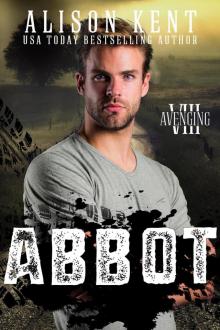 Abbot
Abbot The You I Want For Life (A Mother's Love Book 2)
The You I Want For Life (A Mother's Love Book 2) The You I've Come to Know
The You I've Come to Know The Comfort of Favorite Things (A Hope Springs Novel Book 5)
The Comfort of Favorite Things (A Hope Springs Novel Book 5) The You I Want for Life
The You I Want for Life Hope for the Holidays: a Christmas novella (A Hope Springs Novel Book 6)
Hope for the Holidays: a Christmas novella (A Hope Springs Novel Book 6) Bliss and the Art of Forever (A Hope Springs Novel Book 4)
Bliss and the Art of Forever (A Hope Springs Novel Book 4) Play Me (Barnes Brothers Book 2)
Play Me (Barnes Brothers Book 2) No Limits
No Limits Love in Bloom
Love in Bloom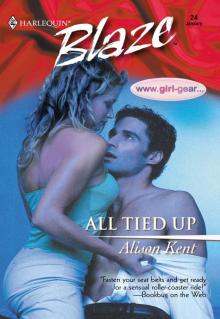 All Tied Up
All Tied Up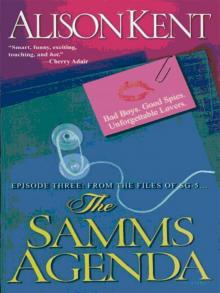 The Samms Agenda
The Samms Agenda The Second Chance Café
The Second Chance Café One-Click Buy: March 2009 Harlequin Blaze
One-Click Buy: March 2009 Harlequin Blaze BOUND TO HAPPEN
BOUND TO HAPPEN The Sweetest Taboo
The Sweetest Taboo The Second Chance Café (A Hope Springs Novel)
The Second Chance Café (A Hope Springs Novel) Undeniable
Undeniable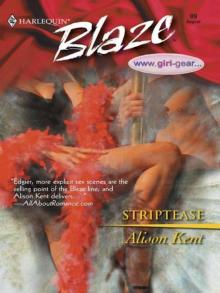 Striptease
Striptease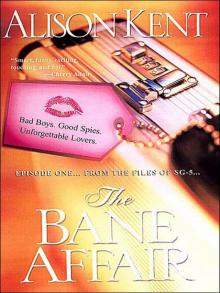 The Bane Affair
The Bane Affair At His Mercy
At His Mercy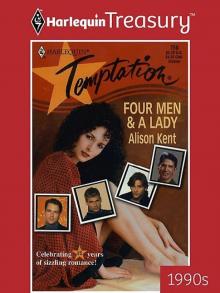 Four Men & A Lady
Four Men & A Lady The Comfort of Favorite Things (A Hope Springs Novel)
The Comfort of Favorite Things (A Hope Springs Novel) Unforgettable (The Dalton Gang #3)
Unforgettable (The Dalton Gang #3) Goes down easy: Roped into romance
Goes down easy: Roped into romance Holiday Kisses: A Rare GiftMistletoe and MargaritasIt's Not Christmas Without YouThis Time Next Year
Holiday Kisses: A Rare GiftMistletoe and MargaritasIt's Not Christmas Without YouThis Time Next Year No strings attached
No strings attached Playing Love's Odds (A Classic Sexy Romantic Suspense)
Playing Love's Odds (A Classic Sexy Romantic Suspense) Unbreakable
Unbreakable Red Hot Holiday Bundle
Red Hot Holiday Bundle Kiss & Makeup
Kiss & Makeup The Shaughnessey Accord
The Shaughnessey Accord Larger Than Life
Larger Than Life Call Me: sold live on CBS 48 Hours (Barnes Brothers Book 1)
Call Me: sold live on CBS 48 Hours (Barnes Brothers Book 1) With Extreme Pleasure
With Extreme Pleasure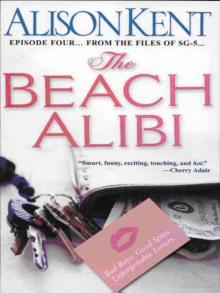 The Beach Alibi
The Beach Alibi Indiscreet
Indiscreet The Sweetness of Honey (A Hope Springs Novel)
The Sweetness of Honey (A Hope Springs Novel) Maximum Exposure
Maximum Exposure